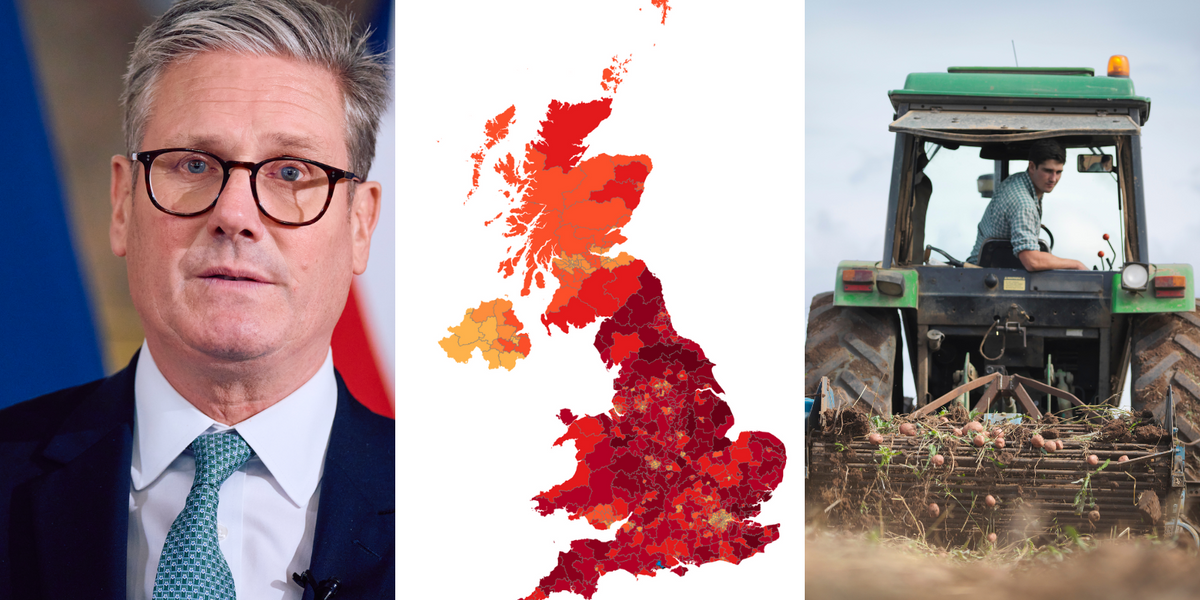Sir Keir Starmer faces a fresh headache as a new map reveals that the highest proportions of signatories calling for an early election are concentrated in counties home to most British farms.
The finding could not come at a worse time for the Prime Minister – the viral online petition has gathered 2,950,536 signatures at the time of writing and is set to be debated by MPs on January 6.
Meanwhile, anger over his proposed changes to inheritance tax, which would impose a 20 per cent levy on farms valued over £1million starting from April 2026, shows no sign of abating.
Around 20,000 farmers gridlocked central London on November 19 to protest Chancellor Reeves’ inheritance tax hike.
The government refuses to back down, arguing that slapping 20 per cent death duties on farmers’ assets over £1million was a ‘fair and balanced’ approach to fill the £22billion black hole.
Farmers are just as recalcitrant. They are planning a round two on December 11 that promises to be bigger and bolder than the last.
One of those leading the march will be Liz Webster, founder of the Save British Farming campaign group. She told GB News: “Farmers are uniting en masse across all four nations. And we are going to show our teeth.
“We’re all f***ing furious, basically. What I’m seeing from farmers is a building fury and pushback because he [Starmer] has no mandate to do this.”
Now, things are about to get even worse for Starmer.
GB News has crunched the data on where most signatories to the online petition are located and compared this with the counties that host the highest number of farms. What we found does not bode well for the PM.
The government refuses to back down over proposed changes to inheritance tax
PA
Exact data is not available but we estimated the number of farms in each county based on acres of farmland and the total land area used for agriculture.
We then compared this to the total number of signatures in each county based on constituency data from the Election Petition map.
What did we find out?
Areas with the highest concentration of signatories were home to most of Britain’s farming industry.
Let’s start with Shropshire, which has over 3,700 farms covering 81 per cent of the county. The county also has around 650,000 acres of farmland.
So far, 30,515 Shropshire constituents have signed the petition calling for an early General Election.
Norfolk, with its extensive arable land, plays a significant role in UK agriculture. The county is estimated to host around 3,000–4,000 farms. So far, 53,633 people have signed the petition.
Cambridgeshire is known for its diverse agricultural landscape, including arable farming (especially cereals and root crops) and livestock operations.
The county has approximately 2,800 farms and so far 31,852 signatures.
Lincolnshire is often cited as one of the largest farming counties in the UK, with its flat and fertile landscape ideal for arable farming.
The agricultural powerhouse hosts approximately 5,500 farms and 44,408 constituents calling for an election.
Devon plays a significant role in the agricultural economy of the South West, contributing to both livestock and arable production. It’s the largest producer of beef and lamb in the UK.
Devon hosts approximately 9,000 farms and 51,536 people calling for an early election.
Areas with the highest concentration of signatories were found to be home to most of Britain’s farming industry
Petition Map
Suffolk is prominent for its arable farming, with large farms producing cereals, sugar beet, potatoes, and more. The region also supports a notable amount of livestock farming.
The county has approximately 3,900 farms and is home to 37,015 people who have signed the election petition.
With its varied landscape, Yorkshire supports a wide range of agricultural activities, from arable farming in the flatlands to sheep farming in the Dales. North Yorkshire, in particular, has been noted for its reliance on agriculture.
Yorkshire is home to approximately 20,000 farms and 152,207 constituents demanding another election.
While known for its expansive landscapes, Northumberland has a tradition of mixed farming, including sheep and arable.
Northumberland is estimated to have approximately 2,500 farms and 6,254 constituents who have signed the election petition.

